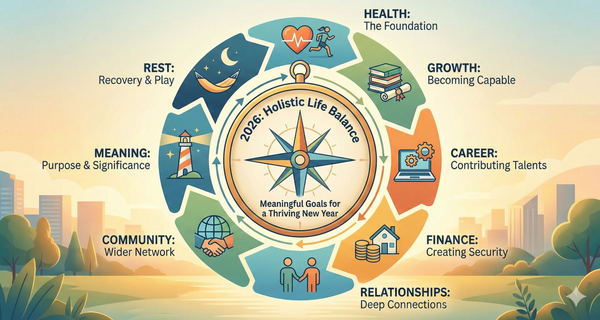Setting Boundaries with Toxic Relatives

Understanding the Landscape: What is a Toxic Relative?
Navigating family relationships can be complex, but dealing with toxic relatives presents a unique and profound challenge to your mental health. It’s a struggle that often goes unseen, shrouded in obligation and guilt. Recognizing that the dynamic is unhealthy is the first brave step. This section will help you identify the specific behaviors that define a toxic relationship and understand the serious impact they have on your well-being, assuring you that your feelings are valid and action is necessary.
Defining 'Toxic': Beyond Annoying Behavior
The term 'toxic' is not about a relative who is merely annoying, quirky, or has different opinions. A toxic relationship is characterized by a persistent pattern of behaviors that are harmful, demeaning, and emotionally damaging. These actions consistently leave you feeling drained, anxious, and devalued. It's about a fundamental lack of respect for your feelings, autonomy, and identity. Unlike a healthy disagreement, toxic interactions are one-sided, focused on control and power, and show no regard for the emotional fallout they cause.
Common Signs of a Toxic Family Dynamic
Toxic behavior manifests in many ways, often masked as "care" or "just the way they are." Key signs include constant criticism that chips away at your self-esteem, manipulation to make you do things you're uncomfortable with, and gaslighting, where your reality is questioned to make you doubt your own sanity. Other red flags are a complete disregard for your boundaries, no matter how many times you state them; making you the scapegoat for family problems; and creating drama or chaos whenever you are together. These patterns are not isolated incidents but a recurring theme in your interactions.
The Toll on Your Mental Health
The cumulative effect of a toxic family dynamic on your mental health is severe. Prolonged exposure can lead to chronic anxiety, depression, and crippling self-doubt. You might find yourself in a constant state of high alert, walking on eggshells to avoid triggering a negative reaction. This emotional turmoil can impact your other relationships, your career, and your physical health. Recognizing that your persistent stress and unhappiness are linked to these family interactions is crucial for seeking change and prioritizing your own well-being.
The Foundation of Freedom: Why Boundaries are Non-Negotiable
Setting boundaries is not an act of aggression or rejection; it is a profound act of self-care and respect. For those dealing with toxic relatives, boundaries are the essential framework you build to protect your sanity and reclaim your life. They are not meant to punish the other person, but to protect yourself. Understanding why these limits are so vital is the key to gathering the courage to establish and maintain them, creating a foundation for a healthier, more peaceful existence.
Protecting Your Peace and Emotional Energy
Toxic relatives can be emotional vampires, draining your energy and leaving you in a state of constant turmoil. Every interaction might feel like a battle, requiring you to defend your choices, feelings, or even your character. Setting firm boundaries creates a shield. It stops the constant influx of negativity, criticism, and drama, preserving your precious emotional energy for things that nourish you. This protected peace is fundamental to mental health and allows you to function without the background noise of toxicity.
Fostering Self-Respect and Confidence
When you consistently allow someone to treat you poorly, it subconsciously erodes your self-respect. You begin to believe the negative things they say or imply. The act of setting a boundary is a powerful declaration that you deserve to be treated with respect. It sends a message to both yourself and the toxic relative that you value your own well-being. Each time you successfully enforce a boundary, you build self-confidence and reinforce the belief that your needs and feelings are valid and important.
Paving the Way for Healthier Relationships
While it may seem counterintuitive, setting boundaries can sometimes lead to healthier relationships in the long run. It teaches others how to treat you. In some cases, a relative may learn to adapt to your new rules of engagement, leading to a more respectful, albeit different, dynamic. And if they don’t, the boundary still serves its purpose by protecting you. Furthermore, the skills you learn in setting boundaries with family will translate to all other areas of your life, helping you build healthier, more respectful connections with friends, partners, and colleagues.
The Practical Guide: How to Build and Maintain Boundaries
Knowing you need boundaries is one thing; implementing them is another. This is the practical, step-by-step part of the journey. It requires introspection, courage, and a commitment to consistency. This is not about a single, dramatic confrontation but about a series of deliberate actions that slowly redefine the terms of your relationships. Follow these steps to build a robust framework that protects your mental health and fosters your self-respect in the face of toxic family dynamics.
Step 1: Identify Your Core Needs and Limits
Before you can communicate a boundary, you must know what it is. Take time to reflect on your interactions. Which behaviors are unacceptable? What topics of conversation are off-limits? How much time can you spend with them before feeling drained? Be specific. Write down your limits. Examples could be: "I will not discuss my finances," "I will not tolerate being yelled at," or "I will only visit for two hours." This clarity is your foundation; without it, your boundaries will be vague and easily crossed.
Step 2: Communicate with Clarity and Calmness
When you communicate a boundary, do it clearly, calmly, and firmly. Avoid long, emotional speeches or blaming language. Use "I" statements to focus on your needs. For example, instead of saying, "You're always criticizing my parenting," say, "I will not participate in conversations that criticize my parenting choices. If it continues, I will leave the room." State the boundary and the consequence of crossing it in a simple, direct manner. You do not need to over-explain or justify your feelings.
Step 3: Prepare for the Pushback (and Hold Firm)
Toxic people benefit from you having no boundaries, so they will almost certainly test them. They may react with anger, play the victim, or use guilt to manipulate you into backing down. This is the most critical moment. You must hold firm. If you state a consequence, you must be prepared to follow through. If you said you would leave, then leave. The first few times are the hardest, but this consistency is what teaches them that you are serious. Backing down teaches them that your boundaries are meaningless.
Step 4: Start Small and Be Consistent
You don't need to build a whole fortress overnight. Start with a smaller, less emotionally charged boundary. This allows you to practice the skill of setting and enforcing limits in a lower-stakes scenario. Once you've successfully held a small boundary, you'll have more confidence to tackle larger ones. The key is consistency. Every time you hold your ground, you reinforce the new dynamic. It's a gradual process of retraining yourself and others on how you expect to be treated.
Navigating Real-Life Scenarios
Theory is one thing, but real life is messy. Boundaries are truly tested during emotionally charged holidays, in the face of manipulative tactics, or when dealing with a barrage of unsolicited opinions. This section provides strategies for applying your boundaries in these specific, high-stress situations. The goal is to equip you with practical tools and scripts so you can feel prepared and stay grounded when faced with the most common challenges posed by toxic relatives.
Managing Guilt Trips and Emotional Manipulation
Guilt is a toxic relative's most powerful weapon. They might say things like, "After all I've done for you, you can't do this one thing for me?" or "You're tearing this family apart." The key is to recognize this for what it is: manipulation. You do not have to absorb their feelings. You can respond calmly and neutrally, without taking the bait. A simple phrase like, "I'm sorry you feel that way, but my decision stands," is often enough. You are not responsible for their emotional reaction to your healthy boundaries.
Surviving Holidays and Family Gatherings
Holidays can feel like a minefield. To navigate them, plan ahead. Set a firm time for arrival and departure, and stick to it. Have an exit strategy. Decide on conversation topics you will not engage with. If someone brings up a forbidden topic, you can say, "I'm not going to discuss that. Let's talk about something else." You can also control the environment by limiting alcohol intake or positioning yourself near supportive family members, if any exist.
Handling Unwanted Advice and Criticism
Constant criticism and unsolicited advice are designed to undermine your confidence. You have every right to shut it down. A useful technique is the "gray rock" method, where you become as uninteresting as a gray rock. Give short, non-committal answers. "Thanks for your input, I'll think about it," or simply, "Okay." This gives them no emotional fuel to continue. For more direct criticism, you can state a clear boundary: "I'm not looking for advice on this topic. Please respect that."
When Boundaries Are Not Enough
You can do everything right—set clear, firm boundaries and maintain them consistently—and still find that the relationship is profoundly damaging. In some cases, the level of toxicity, manipulation, or abuse is so deeply entrenched that simple boundaries are insufficient to protect your mental health. This is a painful realization, and this section is dedicated to navigating that difficult territory, from recognizing the signs to making the hard choice to distance yourself further.
Recognizing the Signs of Deeply Entrenched Toxicity
Boundaries might not be enough when the person shows a complete and utter refusal to acknowledge your limits, repeatedly and intentionally crossing them as a show of power. Other signs include escalating manipulation, rage, or smear campaigns against you when you try to enforce your boundaries. If the relationship causes you constant, severe distress, impacts your ability to function, or involves any form of abuse (emotional, verbal, or otherwise), it is a sign that a more significant separation may be necessary for your safety and well-being.
The Difficult Choice: Limiting Contact or Cutting Ties
If boundaries are repeatedly violated, the next logical step is to increase the distance. This can take the form of "low contact," where you see or speak to them much less frequently and keep all interactions brief and superficial. The most difficult decision is "no contact," which means cutting off all communication. This is a last resort reserved for the most damaging and abusive situations. It is a decision made not out of hate, but out of the ultimate act of self-preservation. It is a choice you have a right to make to protect yourself.
Building Your Chosen Family and Support System
Whether you go low or no contact, creating a robust support system is vital. This is your "chosen family"—the friends, partners, mentors, and therapists who respect you, validate your feelings, and support your growth. These are the people who will remind you that you are not "bad" or "selfish" for protecting yourself. They provide the love, respect, and emotional safety that was missing. Actively nurturing these healthy relationships is as important as distancing yourself from the unhealthy ones.
Conclusion: Your Peace is Your Priority
The journey of setting boundaries with toxic relatives is a courageous and transformative one. It begins with the radical act of acknowledging your own pain and affirming that you deserve to be treated with respect. Remember that setting boundaries is not about changing them; it's about honoring and protecting yourself. This path is not always easy—it requires consistency, courage, and a willingness to withstand pushback—but it leads to a place of profound peace, self-respect, and emotional freedom. You have the right to curate a life that is not defined by familial toxicity, but rather by your own well-being. Prioritize your peace; it is the most valuable asset you have.




